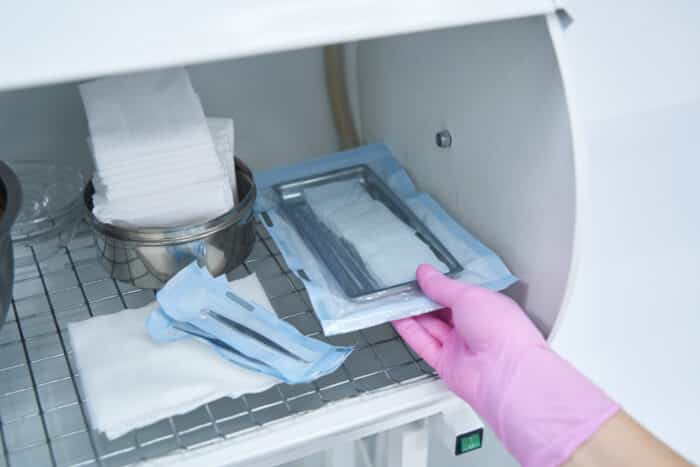Are you interested in becoming a sterile processing technician, but are confused about what all is required to become one?
If yes, you’ve come to the right place.
Pursuing a career as a sterile processing technician is highly rewarding, offers good pay, and is fairly easy since it doesn’t require getting a degree.
As a sterile processing tech, your main role is to keep the instruments and tools used around the clinic or hospital clean and sterile throughout the day, to minimize any contact with pathogens.
In this article, we will discuss more about sterile processing technicians, and the requirements to become one ranging from education to skills to certifications, and more.
Let’s get started.
What is a Sterile Processing Tech and What Do They Do?
Before we dive into the requirements, you might be wondering about what exactly is a sterile processing tech and what their duties involve.
Let us answer that for you.
A Sterile Processing Technician is a healthcare professional responsible for ensuring medical instruments and equipment are properly cleaned, sanitized, and sterilized.
Their main job involves thoroughly cleaning, inspecting, assembling, and sterilizing surgical instruments and medical devices. They follow strict protocols and use specialized equipment to ensure everything is free from contaminants, preventing infections and maintaining a safe environment for patients and healthcare workers.
These technicians play an important role in reducing the risk of infections during medical procedures by ensuring all instruments are properly sterilized and ready for use.
Read: What is a Sterile Processing Technician
Sterile Processing Technician Requirements
If you’re interested in becoming a sterile processing technician, you might be confused or overwhelmed about the process of becoming one, with so much information out there.
We’re here to simplify that for you.
In short, there are little to no requirements for becoming a sterile processing technician, as most employers only prefer candidates to achieve some sort of formal training before they start working.
Even though it might not be necessary in most states, getting certified as a sterile processing tech is one of the best ways of entering this career. This is because most employers prefer certified candidates over uncertified ones.
Let’s dive into it in detail-
Educational Requirements
The best part about pursuing a career in sterile processing is the fact that there are minimum to no educational requirements.
All you require is to complete your high school diploma or a GED and to complete some form of educational training from an accredited school.
There are three types of training programs you can enroll in for sterile processing tech training, such as associate degree programs, diploma/certification programs, and online training programs.
These programs are offered by universities, community colleges, technical colleges, and more.
Read: Sterile Processing Technician Certification
Certification Requirements
As mentioned earlier, even though it is not necessary, getting certified is highly beneficial for sterile processing techs.
There are two primary certifications for sterile processing techs offered by different organizations, such as-
1. Certified Registered Central Service Technician (CRCST):
Offered by organizations like the Certification Board for Sterile Processing and Distribution (CBSPD) or the International Association of Healthcare Central Service Materiel Management (IAHCSMM), this certification validates expertise in sterile processing.
It involves passing an exam that tests knowledge and proficiency in sterilization techniques, infection control, equipment handling, and safety protocols.
2. Certified Sterile Processing and Distribution Technician (CSPDT):
Also provided by the CBSPD, this certification focuses on verifying skills and knowledge in processing and distributing sterile supplies.
Similar to the CRCST, it requires passing an examination that assesses competencies related to sterile processing practices.
See: Sterile Processing Technician Certificate Program Online
State Requirements for Certification
In many states, sterile processing technicians do not require a specific state license. Instead, they may need to meet certain criteria set by healthcare facilities or certification organizations, such as obtaining certifications like the CRCST or CSPDT.
However, some states might have specific regulations or requirements for sterile processing technicians, such as completing a recognized training program or obtaining a certain certification.
It’s important to check with the state’s health department or regulatory board for healthcare professionals to understand any state-specific licensing or certification requirements that might apply.
States That Require Sterile Processing Techs to Get Certification
The following states require sterile processing techs to be certified:
- Connecticut
- New Jersey
- New York
- Pennsylvania
- Tennessee
- Delaware
All the other states mostly do not require any certification, however, many employers still look for certified candidates.
Read more: What Does a Sterile Processing Technician Do?
Skills Requirements
Sterile processing technicians require a range of skills to effectively carry out their duties in healthcare settings:
1. Attention to Detail:
Being meticulous in cleaning, inspecting, and assembling surgical instruments and equipment to ensure they meet safety standards.
2. Knowledge of Sterilization Techniques:
Understanding various sterilization methods, such as steam, gas, and chemical sterilization, and following protocols for each.
3. Technical Proficiency:
Operating and maintaining sterilization equipment and machinery effectively.
4. Infection Control Practices:
Applying strict adherence to infection control protocols to prevent the spread of pathogens and maintain a sterile environment.
5. Communication Skills:
Collaborating with healthcare professionals to ensure instruments and equipment meet specific surgical needs.
6. Adherence to Protocols:
Following established procedures and guidelines for cleaning, packaging, and sterilizing medical instruments.
7. Organizational Skills:
Managing inventory, keeping track of instruments, and ensuring proper stock levels.
8. Adaptability and Flexibility:
Being able to handle various instruments and adapt to changes in procedures or equipment.
Read: Certified Sterile Processing Technician
Sterile Processing Tech – FAQs
How much do sterile processing techs earn hourly?
According to the U.S. Bureau of Labor Statistics, the annual mean income of sterile techs is $44,940, or $21.61 per hour.
What is the job outlook for sterile processing technicians?
The job outlook for sterile processing techs looks fairly positive for the next decade, with an increase in the number of job openings by around 8%.
Related Resources:
- Travel Sterile Processing Technician
- How to Become a Sterile Processing Technician
- Sterile Processing Technician Salary
- Sterile Processing Technician Job Description
- Sterile Processing Technician Resume
- Sterile Processing Technician School
- Sterile Processing Technician vs. Surgical Technologist
- Sterile Processing Technician Course
- Sterile Processing Technician Training Program Cost
- CRCST Certification
Related Articles
-
How to Be Successful in College in 2022 – 7 Simple Tips to Succeed
-
How Do Scholarships Work? Read This First…Truth is Shocking
-
7 Best College Majors 2024: What Should I Major In?
-
How to Choose a College – 10 Things You Must Consider in 2024
-
Why Go to College? Top 13 Benefits for Adult Students in 2022
-
Top 5 Best Alternatives to Community College for 2024








